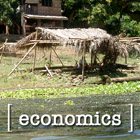
|
CHINESE ECONOMIC JITTERS APPARENT ECONOMIC RESILIENCE MAY BE UNDERMINED BY ENDEMIC VICES 13 December 2003 Consumer prices jumped dramatically in China during the month of November, by the largest margin in 6 years. Cost increases were rooted in soaring prices for food and agricultural products. The Chinese money supply has increased along with prices, prompting warnings from US Fed Chairman Alan Greenspan:
Pricing of goods in China is problematic, as economic output is tied into state-centered industries, market dynamics are still maturing, and poverty remains widespread. Ecological observers have long noted the possibility that China's depletion of arable land, expanding deserts and demand for water, would lead to food scarcity, escalating prices and economic instability. Widespread corruption at local levels —approximately 38,000 indictments in the first 11 months of 2003— creates severe economic distortion in some regions and some sectors, and the fixed currency valuation against the US dollar makes it difficult to accurately assess real costs and the sustainability of industrial and commercial growth. The World Bank is one of several institutions demanding that China act quickly and comprehensively to reform its banking system, to lend it greater transparency before the eyes of foreign analysts, economists and government policy-makers. A complex history of concealed disease-related events —China's government is still resistant to discussing the spreading problem of HIV/AIDS— even led to the World Bank being asked to intervene on behalf of a medical doctor and AIDS activist detained by the state. China is increasingly a source of economic leverage and dependency for a number of powerful economies. The United States relies both on China's cheap manual labor market, and on China's direct financing of US government debt through bond purchases. But the two powers are likely to find themselves competing for the lion's share of a number of international commodities: ranging from grain and affordable foodstuffs to industrial ore, petroleum and even the political capital associated with deciding to tackle negative environmental records. China's northwestern deserts are expanding rapidly, and duststorms are now reaching as far as Beijing in the east, and beyond. Environmental degradation associated with spreading dryness is leading to the collapse of vital inland precipitation cycles and the disappearance of arable land. All of these factors are driving worrying migrations to the south and east of the country, already heavily overburdened with unsustainable urban development. Taken together, many factors suggest that China's spectacular economic progress, touted by observers from all parts of the world as one of the major stories of the turn of the millennium, may be sustained on a series of complex illusions, which need correcting, if the most populous nation in the world is to reach long-term sustainability and a more open system. [For more: EPI] |
|||||||
|
||||||||
